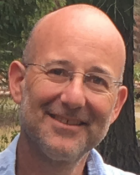
Mark Rubin

Dan RanWeiler
Mark Rubin ‘98, UCLA philosophy graduate alumnus, was interviewed by Dan Ranweiler. Mark is a Principal Software Engineer at Yahoo. Dan is a first-year Ph.D. student in the Department of Philosophy.
DR: Why did you choose UCLA for graduate school?
MR: My advisors at Princeton pushed me to visit UCLA, and so did Kit Fine. And after that visit, there was no doubt in my mind where I was going to go. Literally, the first seminar I sat in on, I witnessed one person make a point and another person say, “You know, I think if we take what you said literally, everything you said has to be false, and I can prove it.” And then they did! And then they said, “But I think you said something interesting that I’ve never heard before and it was really fascinating,” and they resurrected this person’s argument by tweaking it a little bit, giving them complete credit, and pulling something beautiful out of it. I had really never seen anything like that in a philosophy seminar before. It was a beautiful pursuit of truth, and humility, and cooperation. The person whose argument had been resurrected was very grateful. And I just thought, “Wow, this is the kind of philosophy I want to do.” I hadn’t even realized people were doing it. And I saw that consistently. People were friendly, but more importantly, they generally were just more interested in the truth than they were in winning an argument.
DR: What were your interests when you started?
MR: I knew I really liked metaphysics in general. I had a background in logic and theoretical computer science—automata theory, theory of computation, etc. So I suspected I might do some of that since there were so many people at UCLA in those areas—e.g., Alonzo Church, David Kaplan, Kit Fine, Joseph Almog, among others. I liked philosophy of language, too, and assumed I would do that as well. I think the big surprise for me was that I had at best a moderate interest in ethics when I arrived. But at UCLA, I learned that ethics could have such an interesting overlap with the metaphysics I was interested in.
DR: Who did you work with at UCLA and what were they like?
MR: I took some Kaplan courses and I took the required first-year seminars and interacted with whoever was doing that. But I really fell into working with Joseph Almog, who I think retired a few years ago. He was a very interesting character. I loved him—he was very good to me—and very fascinating.
Interestingly though—I mentioned ethics—and Gavin Lawrence’s first-year seminar in ethics had a deep impact on me. I went in as a super Humean relativist, and came out as an Aristotelian, Philippa Footian objectivist. And that was shocking to me! I went in thinking that it was completely obvious that Humean relativism was right and nothing else makes sense, and I left thinking that I was completely, 100% wrong.
DR: What convinced you?
MR: Logic! Reason! How do I put it: there was this metaphysics side of me, and I never thought before about how the two could dovetail. Gavin was just really good at understanding where the relativist impulse comes from, and in a very nonthreatening way, he would just dismantle it over and over again with the same kind of moves. After a while you sort of got to see them and know what the move was for whatever you were about to say. The more he did that, the more I thought about it, and the more I thought he was right. I just became completely convinced.
DR: Do you have any fun anecdotes or memories from your time at UCLA?
MR: There must be no end of anecdotes. One thing about Joseph Almog is that he had been in the Israeli army and he was very physically fit. I was at UCLA during the Northridge earthquake, and there were lots of aftershocks. You would be sitting somewhere and the whole earth would tremble. Joseph liked to meet at Italian cafes. One day, I was sitting at this coffee shop waiting for Joseph, and I’m sitting outside watching him walk toward me. Then suddenly we have one of these aftershocks. I remember seeing this glass window he was walking by bulge out and genuinely bow. I was horrified that this thing was right about to explode all over Joseph. And he turns, looks at the thing, and he sees it come out at him. Without skipping a beat or changing his gait, he just looks forward and continues to walk at exactly the same pace. I remember asking him “Did you see that window almost explode on you?!” And he just said something like, “If you’ve walked the streets of Beirut, nothing fazes you anymore.” I don’t know if that’s the funniest or most bizarre Joseph story, but it was definitely representative of something about him.
“When you hear other people’s views, I think most philosophers instincts are to think not just what’s good about them but about whether they’re true and if you can come up with a counterexample. And If you’re a good programmer, I think most of your programming life is spent thinking about the counterexample.”
DR: What sort of general advice do you have for undergrads? for Ph.D. students?
MR: For undergrads, one of the best lessons I learned was from Kit Fine. I wanted to take some time off after undergrad and was feeling really burnt out, but was worried about delaying any of my admissions offers for fear that they would disappear. And Kit just said: “Look, you have a good background, your professors think well of you, it’ll all be fine.” I stressed out so much about whether this or that grad school would be a perfect fit for me, or whether I would get in here or there, or if I delayed, I would lose some opportunity. And I was just way too anxious: it would all be fine. You have the skills and talent and personality that you have. And if you go to the wrong grad school, you can always change later! Every decision seemed so irrevocable and so portentous, and it’s just not true. It can be stressful being a grad student because often it may feel like your intellectual reputation is at stake or your future is at stake if you don’t perform well in this or that venue or with this or that paper—and it’s just not true. I wish I had had the ability to tell myself: “Just let it go, you are who you are. You’ll be good at some things, bad at others, but it will all be fine.”
“I hope the attitude of pursuing truth in a friendly way over winning the argument remains … I realize how much value there was in not trying to win, but in trying to understand how to get to the truth and to value that process more than winning.”
DR: What type of work are you doing now and how does your background inform that?
MR: I’m a software engineer—a programmer. I’ve programmed for different kinds of devices and platforms, but currently program for Android, which I like a lot. And I’ve thought about how philosophy informs my current work a lot lately, because it’s one of the questions that is most interesting for me when reflecting on my life. Obviously programming, computer science, and analytic philosophy have exactly the same roots: Church, Turing, Russell, Frege, Tarski—mathematical and analytical philosophy and the history of computer science start with many of the same theoretical underpinnings and many of the same people. For example, I studied Tarski and he was primarily a logician and mathematician, but wrote these articles relevant to philosophers interested in logical consequence and logical truth (what I wrote my dissertation on). But I think what most surprised me when I became a professional programmer is the amount of time you spend dealing with things going wrong, rather than right. You always think first about how to get the basic feature done, but then you have to reflect on all these ways in which it will go wrong. You learn quickly that most of your programming is not for the positive case: it’s figuring out what could go wrong and how to protect yourself from it. And that is very philosophical, I think. You think of your argument or opinion, but most of the time you’re thinking: what’s wrong with this? Or what are other people going to say is wrong with this? And when you hear other people’s views, I think most philosophers’ instincts are to think not just what’s good about them but about whether they’re true and if you can come up with a counterexample. And if you’re a good programmer, I think most of your programming life is spent thinking about the counterexample.
The other interesting thing is that as you grow in seniority as a programmer, people become more dependent on you, looking for advice, help, to review code, etc. You have to explain why you advocate doing something in your code one way rather than another. And it never would have occurred to me that the ability to explain a point clearly is as helpful as it is as a programmer. You know, as a philosopher, it’s just part of who you are. You work hard on making yourself clear and on writing in a clear way. It was a surprise to me that I have this skill that people really need in my industry.
DR: What did you love about your time at UCLA?
MR: I hope the attitude of pursuing truth in a friendly way over winning the argument remains. It was great for me as a philosopher, but it really changed me as a person. I had been much more competitive intellectually with people—more than I probably care to remember. For me, an argument was something that was to be won, and maybe even all arguments, not just philosophical ones. And when I realized how much value there was in not trying to win, but in trying to understand how to get to the truth and to value that process more than winning—that really stayed with me my whole life.



